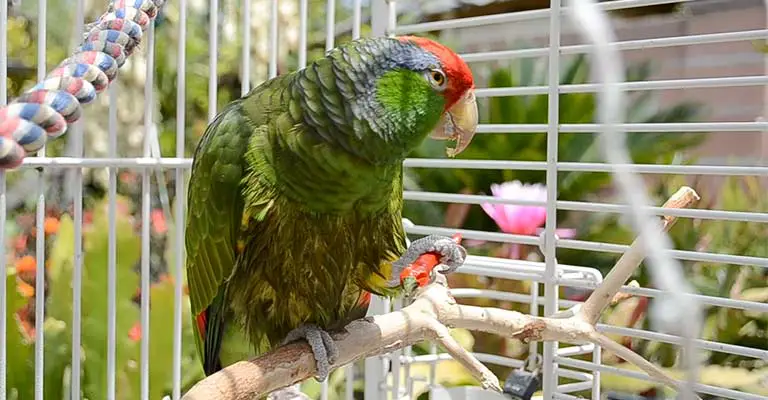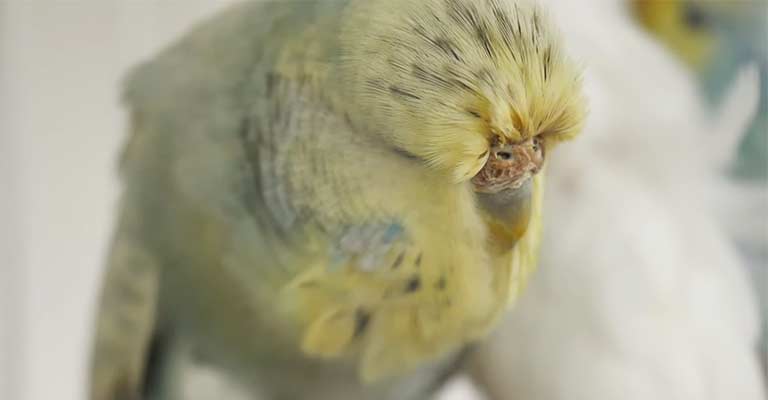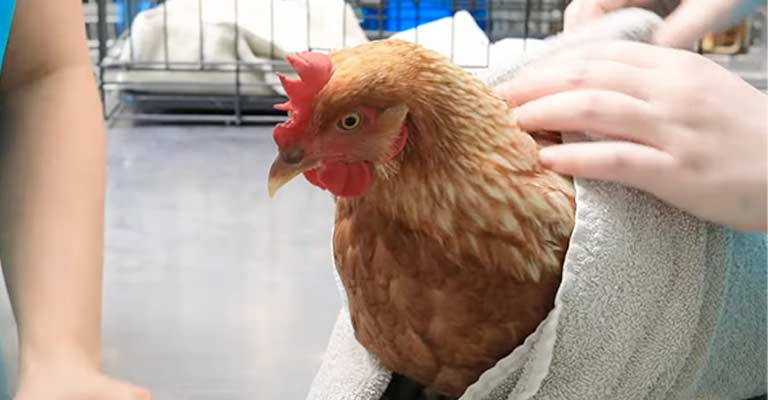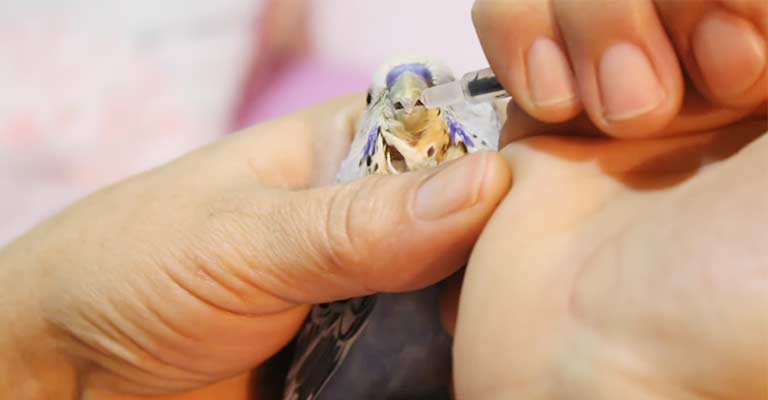Vitamin A deficiency in birds is a prevalent yet preventable health concern that can impact avian species of all varieties. This essential vitamin plays a pivotal role in various physiological functions, from maintaining ocular health to supporting immune function.
Bird owners must be attuned to the signs of vitamin A deficiency and take proactive measures to ensure their feathered companions receive a nutritionally balanced diet.
This exploration delves into the causes, signs, and treatment of vitamin A deficiency in birds, shedding light on the importance of proper nutrition and attentive care to safeguard the well-being of avian friends.

Vitamin A Deficiency In Birds
Vitamin A deficiency in birds is a significant health concern, impacting various physiological functions crucial for their well-being. From vision impairment to compromised immune function, the effects of this deficiency can be diverse.
Here are seven types of vitamin A deficiency in birds:
Ocular Issues
Vitamin A deficiency often manifests as ocular problems, leading to impaired vision, night blindness, or even complete blindness. Birds with insufficient vitamin A may struggle with navigating their surroundings, affecting their overall quality of life.
Respiratory Distress
Birds deficient in vitamin A may experience respiratory issues, including nasal discharge, sneezing, and labored breathing. This deficiency weakens the respiratory epithelium, making birds more susceptible to respiratory infections and complications.
Skin and Feather Abnormalities
Vitamin A deficiency can result in dry, flaky skin and abnormalities in feather structure. Birds may exhibit rough, unkempt plumage, and the overall health of their skin and feathers is compromised, affecting their insulation and protection.
Reproductive Complications
Vitamin A is crucial for reproductive health in birds. Deficiencies may lead to poor eggshell quality, embryonic abnormalities, and decreased fertility. Proper vitamin A levels are essential for successful breeding and healthy offspring.
Compromised Immune Function
Vitamin A plays a vital role in the bird’s immune system. Deficiencies can compromise immune function, making birds more susceptible to infections and diseases. Adequate vitamin A is essential for maintaining robust immunity in avian species.
Digestive Disturbances
Vitamin A deficiency can impact the integrity of the digestive tract lining, leading to issues such as difficulty swallowing, regurgitation, or the development of oral and esophageal lesions. These digestive disturbances can affect the bird’s overall health and nutrient absorption.
Reduced Growth and Development
Growing birds require sufficient vitamin A for proper development. Deficiencies can result in stunted growth, skeletal abnormalities, and delayed maturation. Providing an appropriate diet with adequate vitamin A is crucial for supporting the healthy growth of young birds.
How Do I Know If My Bird Has Vitamin A Deficiency?

Detecting vitamin A deficiency in birds is crucial for preventing the onset of severe health issues. Birds rely on this essential vitamin for various physiological functions, and a deficiency can manifest in diverse ways.
Here are seven signs to help bird owners identify if their feathered companions may be experiencing vitamin A deficiency.
Ocular Changes
Vitamin A deficiency often first affects the eyes. Watch for signs like cloudiness, swelling, or discharge. Birds may exhibit difficulty seeing, have trouble navigating their environment, or even show signs of night blindness.
Respiratory Distress
Birds with vitamin A deficiency may display respiratory issues, such as sneezing, nasal discharge, or labored breathing. These respiratory symptoms are indicative of weakened respiratory epithelium, making birds more susceptible to infections.
Skin and Feather Abnormalities
Check for dry, flaky skin and abnormalities in feather structure. Vitamin A deficiency can lead to rough, unkempt plumage and compromised skin health. Such changes may be indicative of nutritional imbalances affecting the integumentary system.
Reproductive Challenges
Breeding birds with vitamin A deficiency may experience difficulties in reproduction. Poor eggshell quality, embryonic abnormalities, and decreased fertility are potential indicators. Monitor breeding pairs closely for these reproductive challenges.
Compromised Immune Function
A weakened immune system is a significant sign of vitamin A deficiency. Birds may become more susceptible to infections and diseases. Increased vulnerability to illnesses may manifest in frequent illnesses or a failure to recover fully from infections.
Digestive Disturbances
Observe for difficulties in swallowing, regurgitation, or the development of oral and esophageal lesions. Vitamin A deficiency can impact the digestive tract lining, leading to digestive disturbances. Changes in eating behaviors may also be evident.
Stunted Growth in Young Birds
Vitamin A deficiency can affect the growth and development of young birds. Look for signs of stunted growth, skeletal abnormalities, or delayed maturation. Monitoring the growth trajectory of young birds is crucial for early detection.
What Are The Causes Of Vitamin A Deficiency In Birds?

Vitamin A deficiency in birds can arise from various factors, impacting their overall health and well-being. Here are seven common causes of vitamin A deficiency in birds:
Inadequate Diet
A primary cause of vitamin A deficiency is an inadequate diet lacking in foods rich in this essential nutrient. Birds relying on seed-based diets without a variety of fresh vegetables and fruits are at risk. Providing a balanced and varied diet is key to preventing deficiencies.
Poor Nutrient Absorption
Disorders affecting the gastrointestinal tract can hinder the absorption of vitamin A. Conditions such as malabsorption syndromes or diseases that compromise the digestive system can lead to insufficient absorption of essential nutrients, including vitamin A.
Liver Disorders
Vitamin A is stored and processed in the liver, and liver disorders can impair its storage and conversion. Conditions like fatty liver disease or liver damage from exposure to toxins can contribute to vitamin A deficiency in birds.
Inadequate Exposure to Sunlight
Some birds, especially those kept indoors, may not receive sufficient exposure to natural sunlight. Vitamin A is synthesized in the skin through sunlight exposure, and insufficient access to sunlight can contribute to deficiencies.
Underlying Health Issues
Chronic illnesses or infections can deplete the body’s stores of vitamin A. Birds experiencing prolonged health issues may be more susceptible to deficiencies, highlighting the importance of timely veterinary intervention and treatment.
Breeding and Increased Demand
Breeding birds and those with increased metabolic demands, such as growing chicks, may require higher levels of vitamin A. Failure to adjust the diet to meet these increased demands can result in deficiencies, impacting the health of both parents and offspring.
Storage and Processing of Commercial Diets
Improper storage and processing of commercial bird diets can contribute to vitamin A degradation. Exposure to light, air, or improper storage conditions can lead to the loss of this essential nutrient, affecting the nutritional quality of the feed.
How Do You Treat Vitamin A Deficiency In Birds?

Treating vitamin A deficiency in birds is vital for restoring their health and preventing the progression of related complications. Addressing the underlying causes and providing targeted interventions are key components of effective treatment.
Here are seven types of treatment commonly employed for vitamin A deficiency in birds:
Dietary Modification
Adjusting the bird’s diet to include foods rich in vitamin A is fundamental. Introducing a variety of fresh vegetables, fruits, and leafy greens can help meet the bird’s nutritional needs. A balanced and species-appropriate diet is crucial for long-term management.
Vitamin A Supplements
Veterinary-prescribed vitamin A supplements may be necessary to rapidly address deficiencies. These supplements, provided in precise dosages, help replenish vitamin A levels in the bird’s system. Close monitoring and veterinary guidance are essential to prevent overdosing.
Topical Vitamin A Application
In some cases, topical application of vitamin A may be recommended. This can involve applying vitamin A-rich ointments or solutions to the skin, allowing for absorption through the skin’s surface. This method is particularly useful in birds with difficulty ingesting oral supplements.
Exposure to Natural Sunlight
For birds with limited exposure to natural sunlight, increasing their access to sunlight can support vitamin A synthesis in the skin. Outdoor aviaries or supervised outdoor time can contribute to the bird’s overall well-being and help maintain optimal vitamin A levels.
Addressing Underlying Health Issues
If vitamin A deficiency is secondary to an underlying health condition, addressing the primary health issue is crucial. Veterinary treatment for concurrent illnesses or infections may be necessary to support the bird’s recovery.
Liver Supportive Medications
In cases where liver function is compromised, medications that support liver health may be prescribed. These medications aim to improve liver function, facilitating the storage and conversion of vitamin A. Veterinary guidance is essential for proper usage.
Regular Veterinary Check-ups
Monitoring the bird’s vitamin A levels through regular veterinary check-ups is crucial for ongoing management. Periodic assessments allow for adjustments to the treatment plan, ensuring that the bird’s nutritional needs are met and preventing future deficiencies.
Combining these treatment approaches tailored to the individual bird’s condition is essential for the effective management of vitamin A deficiency. Bird owners should work closely with avian veterinarians to determine the most appropriate course of treatment, ensuring the bird’s overall health and longevity.
FAQs
What causes vitamin A deficiency in birds?
Causes include inadequate diet, poor nutrient absorption, liver disorders, lack of sunlight exposure, underlying health issues, increased metabolic demands, and improper storage of commercial diets.
Can vitamin A deficiency be treated with diet alone?
In mild cases, dietary modification may suffice. However, severe deficiencies often require veterinary-prescribed supplements or topical applications for faster restoration.
How can I provide vitamin A for my bird?
Offer a varied diet rich in vitamin A sources, including leafy greens, orange and yellow vegetables, and certain fruits. Consult your vet for specific dietary recommendations.
Are there risks associated with vitamin A supplements for birds?
Yes, overdose risks exist. It’s crucial to follow veterinary guidance on supplement dosage and seek professional advice before introducing any supplements.
Can vitamin A deficiency be prevented in pet birds?
Yes, preventive measures include offering a balanced diet, ensuring exposure to natural sunlight, addressing underlying health issues promptly, and scheduling regular veterinary check-ups.
Conclusion
Addressing vitamin A deficiency in birds demands a multifaceted approach involving dietary adjustments, veterinary intervention, and ongoing monitoring.
Bird owners play a crucial role in preventing deficiencies through the provision of a diverse and vitamin-rich diet. Regular veterinary check-ups are instrumental in early detection and timely treatment, ensuring that birds lead healthy, vibrant lives.
By prioritizing nutritional needs and staying vigilant for signs of deficiency, bird enthusiasts contribute to the vitality and longevity of their feathered companions, fostering a harmonious and thriving avian community.